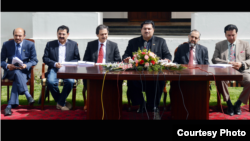Pakistan said it will consider making India part of a bilateral trade and transit agreement with landlocked Afghanistan as long as New Delhi formally sends a request to both countries. The announcement precedes Afghan President Ashraf Ghani’s maiden trip to India later this month.
A tension-free relationship between Afghanistan and Pakistan is considered vital for tackling challenges such as terrorism and poverty facing the two militancy-plagued neighbors, sharing a 2,400-kilometer border.
In recent months, both sides have taken important steps and exchanged high-level political, military, and economic visits to normalize ties usually marred by mistrust and suspicion.
This week, Pakistani Commerce Minister Khurram Dastgir Khan traveled to Kabul for talks to build "enhanced economic engagement.”
Khan said the two days of discussions focused on Afghan complaints related to the so-called Afghanistan-Pakistan Transit Trade Agreement (APTTA).
He said the government of Pakistan has "implemented the reduction in scanning of Afghan transit cargo from 100 percent in the past down to 20 percent only."
"Afghan trucks can now carry cargo, Afghan exports, all the way across Pakistan, to Wagah [post] at the India border," he added. "We are hoping that by implementation of these steps, a very major portion of irritants in transit trade, have been resolved.”
Previously, Afghan trucks could transport India-bound export cargo only up to Pakistani border cities from where Pakistani trucks would carry it to the eastern border post of Wagah.
Khan said Afghan trucks on their way back from the Indian border would also be allowed to pick up cargo to carry to Afghanistan. Pakistan does not allow rival Inda to export its goods to Afghanistan and onward through its territory, citing tension in bilateral ties.
Afghan traders were unhappy about scanning of cargo shipments at the Pakistani port city of Karachi, saying it would cause unnecessary delays and encourage corruption for quick processing of documents. Under the bilateral treaty Afghanistan also facilitates Pakistani exports through its territory to central Asian countries.
Khan did not rule out Afghan calls for including India in the transit trade agreement to allow Indian exports to Afghanistan and other Central Asian markets, .
“Any other country wishes to enter into the arrangement has to formally send its request to both countries," he said. "We are willing to consider such applications and we are hoping that if we receive it we will consider it and take decisions.”
A day before the Pakistani delegation arrived in Afghanistan, the Indian embassy in Kabul, through a formal letter to the Afghan government, expressed New Delhi’s “willingness and desire” to join the country’s transit trade agreement with rival Pakistan.
In response, the Afghan foreign ministry said it would welcome India if it wants to join the transit trade agreement.
But Khan insisted the transit trade agreement is strictly a bilateral understanding, and advised against any change in the current status at this stage.
"This positive new relationship between Afghanistan and Pakistan should not be made conditional on a third country," he said. "We have this great opportunity to move away from the suspicions of the past decade and a half and we have this opportunity to move forward quickly. We should complete our task that is in front of us, which is shared prosperity through economic integration."
Khan also said Afghan leaders have assured him they will take immediate steps to address issues hindering Pakistani businessmen from freely undertaking commercial activities in Afghanistan.
They include issuance of multiple entry visas to Pakistani investors and skilled laborers as well as removal of custom duties on goods in transit to Central Asian countries.









